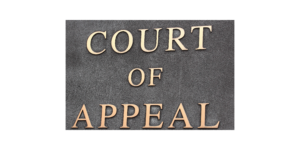When Will the Prosecution Appeal Against a Court’s Decision in a Criminal Case?

The decision to appeal against a court ‘s decision in a criminal case can be a costly and time consuming process, as well as potentially re-traumatising for both the complainant and defendant – and this can be the case whether the appeal is by the defence or the prosecution.
In relation to appeals by the prosecution against decisions relating to New South Wales offences, such as those contained in the Crimes Act 1900, prosecution guidelines set out the criteria that the Office of the Director of Public Prosecutions (ODPP) is required to consider when considering whether to file and pursue an appeal.
Here’s a summary of the rules.
Interlocutory Appeals
An interlocutory appeal is an appeal against a decision by a judge other than the final determining of a proceeding.
Example of interlocutory judgments that can be appealed include decisions about the admissibility of evidence or the timeframe of a trial.
The NSW DPP has a right of appeal to the Court of Criminal Appeal (CCA) against an interlocutory judgment or order made by a judge in the District Court or Supreme Court.
NSW prosecution guidelines make it clear that before making an interlocutory appeal, prosecutors must satisfied that:
- An unfavourable decision may be amenable to appeal; and
- The judge made an error in reaching the decision.
Appeals Against Acquittals
An acquittal is a finding that a person is not-guilty of the crime with which they have been charged.
NSW prosecution guidelines outline a number of considerations before an appeal against acquittal will be made.
If the appeal against acquittal is on the basis of a question of law alone, the Director of Public Prosecutions will only lodge an appeal if satisfied:
- The acquittal arose from an error involving a question of law alone;
- The Court would exercise its discretion in favour of ordering a retrial.
- There is fresh and compelling evidence, in the case of an offence with a maximum penalty of life imprisonment.
- The acquittal is tainted, in the case of an offence with a maximum penalty of 15 years or more. The DPP will only make an application if a retrial would be in the interests of justice.
Appeals Against Sentence
Once a person convicted of an offence has been sentenced, prosecutors may wish to appeal against the sentence imposed if it is viewed as manifestly inadequate.
NSW prosecution guidelines make it clear that appeals against sentences should be rare.
Appeals to the District Court against sentences imposed in the Local Court must occur within 28 days after the sentencing decision. NSW prosecution guidelines make it clear that this should only occur if there is a reasonable prospect that the appeal would succeed.
Appeals against sentence to the Court of Criminal Appeal require a more in-depth assessment before they occur.
Only the Director or Deputy Director of Public Prosecutions can determine whether or not to appeal against sentence to the Court of Criminal Appeal.
Prior to an appeal, prosecutors must assess all sentences imposed to determine whether they may be the subject of an appeal. There is no statutory time limit, but delay in lodging an appeal may impact on the appeal court’s decision. Matters where the offender has been sentenced to a penalty other than full-time detention should be expedited.
Prosecution appeals against sentence should only be brought:
- To enable the courts to establish and maintain adequate standards of punishment for crime.
- To enable idiosyncratic approaches to be corrected.
- To correct sentences that are so disproportionate to the seriousness of the crime as to lead to a loss of confidence in the administration of criminal justice.
Mere dissatisfaction by the prosecution with the sentence passed is not enough to warrant an appeal.






